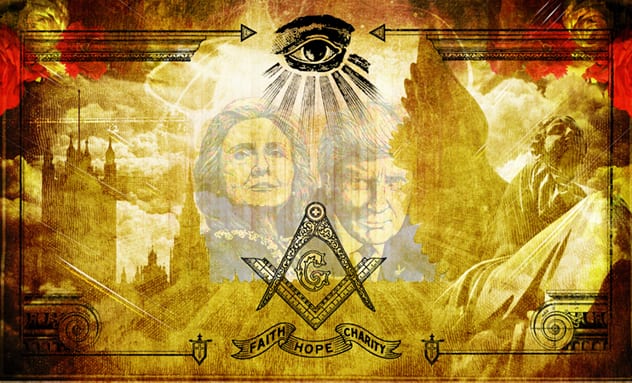 Creepy
Creepy  Creepy
Creepy  Movies and TV
Movies and TV 10 Amazing Lead Actor Ideas for Superhero Movies
 Our World
Our World 10 Crazy Facts about Cycads That Might Surprise You
 Technology
Technology 10 World-Changing Examples of Turning Dumb Technology into Smart Technology
 Pop Culture
Pop Culture Ten Celebrities Who Straight-Up Lied on Home Tours
 Animals
Animals 10 Remarkable Things We’ve Recently Learned about Animals
 Weird Stuff
Weird Stuff 10 Reasons the Psychic Internet Theory Will Blow Your Mind
 Movies and TV
Movies and TV Television’s Top Ten Most Ruthless Serial Killers
 Weird Stuff
Weird Stuff Ten of the Strangest Paraphilias Ever Documented
 Miscellaneous
Miscellaneous 10 Interesting Physics Facts about Bullets
 Creepy
Creepy 10 Unnerving Legends from Around the World
 Movies and TV
Movies and TV 10 Amazing Lead Actor Ideas for Superhero Movies
 Our World
Our World 10 Crazy Facts about Cycads That Might Surprise You
Who's Behind Listverse?

Jamie Frater
Head Editor
Jamie founded Listverse due to an insatiable desire to share fascinating, obscure, and bizarre facts. He has been a guest speaker on numerous national radio and television stations and is a five time published author.
More About Us Technology
Technology 10 World-Changing Examples of Turning Dumb Technology into Smart Technology
 Pop Culture
Pop Culture Ten Celebrities Who Straight-Up Lied on Home Tours
 Animals
Animals 10 Remarkable Things We’ve Recently Learned about Animals
 Weird Stuff
Weird Stuff 10 Reasons the Psychic Internet Theory Will Blow Your Mind
 Movies and TV
Movies and TV Television’s Top Ten Most Ruthless Serial Killers
 Weird Stuff
Weird Stuff Ten of the Strangest Paraphilias Ever Documented
 Miscellaneous
Miscellaneous 10 Interesting Physics Facts about Bullets
10 Mysterious Religions Practiced In The Shadows
Shadow religions challenge the mainstream. They blur the line between devotion and heresy. Many are syncretic—or hybrids of many theologies. These mixed faiths have a curious way of annoying power structures, particularly when the movements emerge from lower classes or contain foreign ideas. Some of these faiths are made even more obscure by limiting their deepest mysteries to the initiated.
10Aalwites

One in 12 Syrians is an Alawite, practitioners of a secretive sect of Islam dating to the ninth century. These Shiites worship Mohammed’s son-in-law Ali as a god, deny women have souls, and believe in reincarnation. The Ottomans despised them. Sunni do not believe they are Muslim.
Alawites are accused of using a veil of Islam to hide their radical beliefs. “Fasting” means keeping secrets. And a “pilgrimage” is a visit to their sheiks. Ibn Battuta, the 14th-century chronicler, noted they did not attend mosque or maintain those provided for them.
President Bashar Al-Assad of Syria is a member of the sect. He is currently working to normalize this shadowy faith. However, many suspect that centuries-old Alawite-Sunni grievances are the subtext of much of the Syrian conflict.
9Candomble

Candomble came to Brazil on slave ships. It is syncretic, mixing Catholic imagery with a veneration of traditional West African orixas (spirits). Their all-powerful god is aided by lesser helper spirits and personal guide spirits. Practitioners do not believe in good or evil, only personal destiny.
Since the 1970s, when the ban on public gathering without police permission was lifted, people started identifying more with the religion. In recent years Evangelical Christianity has been on the rise in Brazil, and to combat the political influence of these new Christians, some created a Candomble political party: PPLE, the Party for Freedom of Expression. Evangelicals have attacked shrines and labeled followers devil worshipers. The politics of race are at the core of the issue. Brazil was the last country to outlaw slavery. Half of the population considers themselves black yet have little political power, and Candomble is an unmistakably African religion.
8Kakure Kirishitan

The Kakure Kirishitans are Japan’s hidden Christians. After the Tokugawa Shogunate banned their religion, the faithful took it underground. Kakure Kirishitan remained hidden for 450 years, long after the persecution lifted in 1873.
Developing in the shadows, this faith morphed into something the mid-1500 Spanish missionaries who introduced it would barely recognize. Kakure Kirishitans fused Catholicism with Shintoism and Buddhism. They eliminated all outward relics, disguised Mary and Jesus as Buddahs, and camouflaged prayers as chants. However, they retain the original Christian music brought to them. These Latin hymns let listeners time-travel to 16th-century Spain.
7Yazidi

Numbering 700,000 worldwide, the Yazidi are so secretive, many of its beliefs are not even known by the faithful. Their holy books are hidden from laypeople, and the initiated must swear never to reveal their secrets.
After centuries of persecution, the Yazidi are wary of outsiders. Under Ottoman rule, they faced 72 separate genocides. Both Al-Qaida and ISIS labeled them infidels. The Yazidi have a reputation as devil worshipers. They venerate Melek Tawwus, the Peacock Angel, who fell from grace. They practice an array of beliefs: baptism, removing shoes in church, and viewing fire as a divine manifestation. They also pray three times a day—but toward the Sun, rather than Mecca.
6New Mexico’s Crypto Jews

During the 15th century, the Iberian Peninsula burned with anti-Semitism. Sephardic Jews, who had inhabited Spain for centuries, were forced to convert or die. Many conversos were baptized but remained Jewish in secret. Others fled.
New Mexico has long held a folk tradition that it was settled by crypto-Jews. Tales of kosher slaughtering and Stars of David engraved on tombstones offered tantalizing evidence. For years, these have been dismissed as the work of extreme Christian sects.
However, recent DNA testing offered proof. While less than 1 percent of non-Jews possess the Jewish Cohanim gene, the marker was found in 38 percent of those tested in New Mexico. It is believed that a population of crypto-Jews settled the area when the Inquisition reached Mexico. These hidden Jews had to practice in secret. Sometimes, only extremely superficial practices remained. Many New Mexicans who were raised Catholic have officially converted to Judaism—embracing their “true” identity.
5Santeria

Santeria—or Way of the Saints—was brought to Cuba through slaves. It developed in 18th-century sugar plantations mainly among the Yoruba people of Nigeria, who used Catholic saints as analogues for their orishas, semi-divine spirits. For centuries, Santeria was condemned, first by the Catholic overlords of the island and then by the vehemently anti-religious Castro.
Centuries of persecution and oppression sent the religion into the shadows. The faith owes its survival to its rich oral tradition, which is passed meticulously from one generation of initiates to the next. Much of the theology of Santeria is obscure to its laypeople. Many rites, like animal sacrifice, can only be viewed by priests—or Santeros.
4Chinese Secret Societies

China is officially atheist. Their Communist party only recognizes five faiths: Buddhism, Taoism, Islam, Catholicism, and Protestantism. Many Christians cannot find what they are looking for on this limited menu and are forced underground into a black religious marketplace. These religious misfits gather in secret venues in private homes or other locations to express their faith.
The Chinese government has been cracking down on Christians. Over the past two years, 1,700 crosses have been torn down from churches in Zhejiang Province alone. Oftentimes, this government-sanctioned vandalism is accompanied by violent clashes with practitioners. China currently has an estimated 65 million Christians—half of whom worship in secret. Soon it will be the largest Christian country in the world.
3Umbanda

Umbanda is Brazil’s only homegrown religion. The religion was founded by the psychic medium Fernandino de Moraes, who merged African traditions, Catholicism, Spiritism, and Indigenous beliefs. One variety known as “Quimbanda” or “black magic” is now considered a separate religion.
There are 400,000 estimated followers of Umbanda, most of whom practice in secret to avoid threats and vandalism. The majority of the Brazilian population considers this devil worship. The rise of Pentacostals and Evangelicals are a major threat. Several pastors have been arrested for encouraging religious intolerance toward Umbanda.
2Druze

The Druze practice a secret faith, derived from yet separate from Islam. It incorporates elements of Christianity, Hinduism, and Greek philosophy. The Druze are spread throughout the Middle East. Following the collapse of the Ottoman Empire, most settled in Syria, Lebanon, Jordan, and Israel.
The Druze have been key figures in Middle East history. They defended the Lebanese coast from Crusaders and won autonomy from the Ottomans after frequent rebellions. They have clung to mountainous territory for self-determination and to maintain the secrets of their shadowy faith. Only elite initiates, known as “uqqal,” participate fully in their religious services and have access to their holy scriptures.
1Chueta

The Chuetas of Majorca are crypto-Jews who have been persecuted for centuries. Their name is believed to derive from the Catalan word for “pork.” The Chueta forcibly converted to Catholicism during the 15th-century Inquisition, but many continued to secretly practice Judaism.
The Chueta, who comprise 20,000 of the island’s 860,000 inhabitants, have had a great deal of difficulty keeping their faith hidden. With easily identifiable surnames, they were the object of ridicule, shut out of mainstream occupations, and barred from entering university. Many claim there has been no intermarriage between Catholics and Chueta until the last two generations.
Times are starting to change. The government of Majorca recently apologized for a 1691 massacre, in which 37 Chueta were burned to death in front of an audience of 30,000. Additionally, a rabbinical court in Israel has determined that Chueta who can trace Jewish ancestry—often through meticulously maintained family trees—are considered Jews without a formal conversion.
+Further Reading

Religion is a fascinating topic, but add secrecy to the mix and you move it up to a whole new level! Here are some historic lists that deal in mystery, secrecy, and religion
10 Strange And Obscure Secret Societies
10 Secret Societies That Influenced History
Top 10 Scandalous Freemason Secrets
10 Great Works Of Art With Incredible Secret Meanings
Abraham Rinquist is the executive director of the Winooski, Vermont branch of the Helen Hartness Flanders Folklore Society. He is the co-author of Codex Exotica and Song-Catcher: The Adventures of Blackwater Jukebox.








